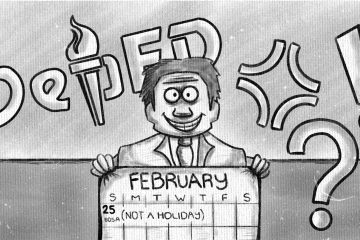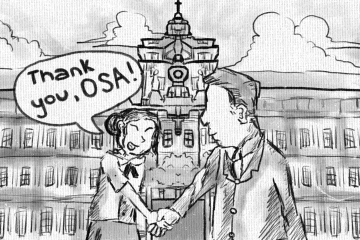By Patrick V. Miguel
A year into the pandemic, I found myself standing in the bathroom, cursing as the bleach stings my scalp. Maybe watching Brad Mondo’s videos on Youtube reassured me that I would not ruin my “perfectly healthy locks”—but that was the dilemma.
I always painted my appearance based on what my family, the people I dated, and my school wanted me to be. Clean-cut and “ordinary” like a shampoo commercial’s view on “perfectly straight and manageable hair.” I asked myself, how do I want to present myself to the world?
The last time I was on campus, I looked like a conventional student from a Catholic school. The kind that says “Estudyante po” while handing out my fare inside the jeep. With just a glimpse, the driver would already know that I would avail of the student discount.
I wore the same uniform as every guy who roamed the school hallways, sporting short black hair with no dangles hanging on my earlobes. Despite expressing my style by wearing bracelets, sweaters, and colorful printed socks, I still felt like a sheep in a flock.
My hands were shackled, after all, as I was bound by the strict dress code. No ear piercings. No heavy make-up. No hair color. Overall, no freedom to express my “individuality.”
However, after more than a year of never-ending modules and unbearable Zoom calls, I realized that the online set-up gave the students the liberty to express their style. Many of us colored our hair, got more piercings, and experimented on new clothes. Even guys grew their tresses longer. Most of us no longer looked like the same students who left school in March 2020.
As much as our school administration would refuse to admit, these changes are completely harmless. I guess it takes a few backward narratives to convict our styles as transgressions. It has been an ever-present academic and professional dispute, but as the famous TikTok song says, “Having colored hair doesn’t make you unprofessional.”
That being said, I hope we all get to speak that louder for the people sitting at the back, refusing to move forward with time. If our ways to express our style are considered transgressions, would Elle Woods be there to defend me for having the same hair color as hers? Court adjourned.
In the end, it is not dyeing your hair blonde that matters because that would be an erroneous discourse on eurocentric standards. The point of this is to dare yourself to go beyond limits, outside your comfort zone, without seeking validation.
You can change your hair, wear new and daring clothes, or perhaps get a tattoo and some piercings. It is time to give yourself the chance to get out of the prison that “normy” standards forced you to conform to.
As cliche as it sounds, life is short, and reflecting on current affairs in the Philippines, dyeing your hair (for example) is not the worst thing you could do. However, the worst thing you could do is illegally detain yourself within the borders of other people’s narratives. F
Editor’s Note: This column was originally published in Vol. 57, Issue No. 1 of The Flame. View the entire issue through this link.




